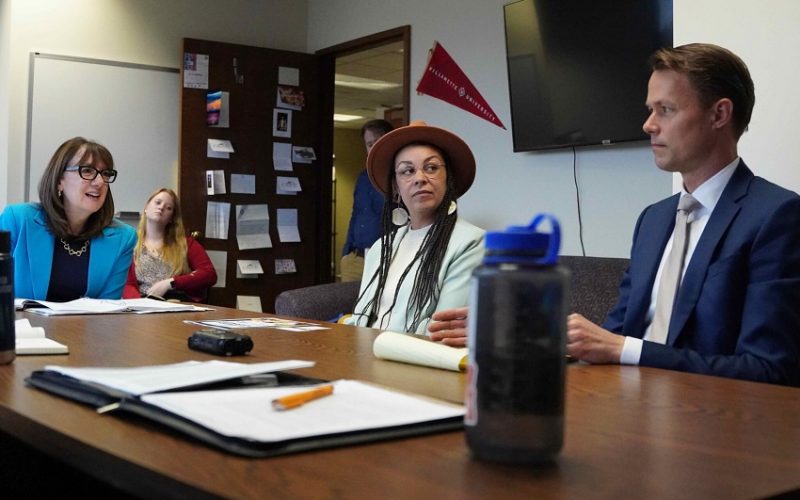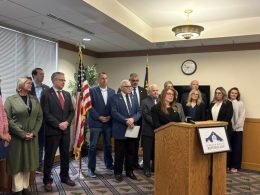Salem, OR – Oregon’s capital city, Salem, and its surrounding areas are feeling the ripple effects of federal funding cuts and the freezing of key grants, which are disrupting vital community programs and agricultural operations. These impacts are being felt by farmers, nonprofits, and small businesses, all of whom rely on federal support to sustain their work. Local business owners and community leaders shared their concerns with U.S. Representative Andrea Salinas, who represents Oregon’s 6th Congressional District, during a meeting at her Salem office this past Thursday.
Food Banks Face Unprecedented Demand
Rick Gaupo, Executive Director of Marion Polk Food Share, spoke candidly about the increasing strain on food banks due to both rising demand and federal funding cuts. The nonprofit, which runs programs like Meals on Wheels, has seen a dramatic increase in the number of individuals seeking food assistance. Pre-pandemic, the organization served around 10,000 visitors per month. Today, that number has surged to 18,000. With grocery prices and rent climbing nearly 30% since before COVID-19, food banks are struggling to keep up.
One of the most pressing concerns is a freeze on commodity purchases, which has meant that truckloads of food that would have been distributed to families and seniors have been halted. As a result, Marion Polk Food Share has had to stop accepting new seniors into its program, cutting off a critical resource for many in need.
“This is less food on somebody’s table,” Gaupo explained. “That’s just gone.” The freeze comes at a time when food banks are seeing unprecedented demand, further exacerbated by fears of potential cuts to Medicaid and Medicare.
Farmers Grapple with Funding Uncertainty
The challenges extend beyond food insecurity. Local farmers, particularly those involved in sustainable practices and climate-smart agriculture, have also felt the sting of federal funding cuts. Todd Severson, CEO of Chapul Farms in McMinnville, shared his frustrations over delayed and frozen grants that were critical to expanding his business. Chapul Farms specializes in raising black soldier flies to convert food waste into fertilizer. Severson had received a $3.9 million grant from the U.S. Department of Agriculture (USDA) to ramp up domestic fertilizer production but is still waiting to receive the final 10% of that funding. He also secured a $1.9 million grant to partner with small farms on climate-smart practices but is uncertain whether those funds will materialize.
With staff layoffs at federal agencies and no clear communication on the status of these grants, Severson is left in limbo, unsure of how to move forward with the projects that were meant to help combat fertilizer shortages exacerbated by the war in Ukraine.
BIPOC Farmers Fear Loss of Key Grant Funding
The uncertainty surrounding federal grants also impacts programs aimed at fostering diversity and equity in agriculture. Nikita Vincent, owner of Twig & Bloom Flower Farm in Monmouth, is concerned that a $80,000 grant awarded to the city of Monmouth for a year-round indoor farmers market may be lost due to shifting federal priorities. The market is intended to highlight the work of Black, Indigenous, and People of Color (BIPOC) farmers and artisans in the mid-Willamette Valley. Vincent, who worked with local farmers and the city to create the proposal, fears that the federal administration’s stance on diversity, equity, and inclusion could jeopardize the project.
“My biggest scare is the fact that BIPOC is literally the first word for that feasibility study proposal,” Vincent said. “I’m afraid that it might be cut simply because we’re looking to include BIPOC farmers.”
Conservation Efforts at Risk
Environmental conservation programs, crucial for maintaining Oregon’s unique ecosystems, are also facing setbacks. The Yamhill Soil & Water Conservation District, which helps landowners restore and protect native habitats, has been caught in the crossfire of funding freezes. Executive Director Andy Bleckinger reported that a $6.6 million federal grant intended for habitat restoration has been frozen just as the district began hiring additional staff to expand its conservation efforts. The freeze threatens to halt crucial work in Oregon’s wine country, where the restoration of oak savannas and prairies helps control fire risks and provides a natural pest control system for vineyards.
“We were sending emails, trying to get communication on signing the contract agreement, and nothing,” Bleckinger said. “It’s frustrating. We heard from other states that they were facing the same issues, but no one had answers for us.”
Impacts on Oregon’s Nursery Industry
Oregon’s $1.2 billion nursery industry is also feeling the impact of federal cuts. Ben Verhoeven, president of the Oregon Association of Nurseries, explained that cancellations from Canadian customers, who account for 10% of Oregon’s plant exports, are already affecting sales. Additionally, job cuts at USDA inspection offices have resulted in delays at ports, leaving imported plant cuttings sitting in trucks and wilting before they can reach their destination.
“Delays are a big issue for us,” Verhoeven said. “These plants are coming in overnight shipments, and when they’re delayed, we can’t get them back in time. That affects everything from our business operations to the broader economy.”
Weather Forecasting and Agricultural Research at Risk
Farmers also expressed concerns over cuts to staff at the National Oceanic and Atmospheric Administration (NOAA), which provides critical weather forecasts and agricultural research. Verhoeven noted that accurate long-term weather forecasts are vital for planning agricultural operations, and many farmers rely heavily on NOAA’s expertise for pesticide safety research and reliable weather predictions.
“As any farmer will tell you, the weather isn’t just small talk, it’s big business,” Verhoeven said. “We rely on NOAA to provide the data we need. I hope that Congress can ensure that this remains a top priority.”
A Shared Concern for Oregon’s Future
The concerns voiced by local farmers, food banks, and businesses reflect a broader sense of uncertainty and frustration with the current federal funding landscape. For many, the federal grants and programs that were once a reliable source of support are now in jeopardy, leaving communities to scramble for solutions. As Rep. Andrea Salinas listens to the struggles of her constituents, it is clear that federal policy changes are having a profound impact on the people who rely on these programs to sustain their livelihoods and support their communities.
“None of this is about saving programs; it’s about saving the work on the ground,” Salinas said. “It’s about ensuring that people who are working to feed their families, grow our food, and conserve our environment aren’t left behind.”
With the future of many vital programs uncertain, it remains to be seen how these challenges will be addressed, and what the long-term consequences will be for Oregon’s farmers, nonprofits, and local businesses.











